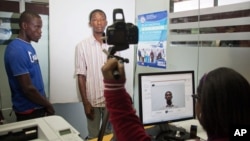The Dominican Republic has set midnight Wednesday as the deadline for a new immigration law that could result in the expulsion of hundreds of thousands of Haitian immigrants and those of Haitian descent, whom it accuses of illegally living in the country.
Haitian Prime Minister Evans Paul, in a press conference Monday, said it was unclear when the deportations would take place. He added there were reports that some had already begun.
"We have heard mixed statements from Dominican officials on the expulsion," Paul said. "On one hand, the Dominican minister of foreign affairs, Andres Navarro, has said that they would not do the expulsion en masse. On the other hand, there other Dominican officials who said there will be massive expulsion."
Paul added that his government would assume its responsibility and face the situation.
"It is also the responsibility of Haiti as a whole," he said.
Vulnerable Population
Ilaria Lanzoni, from the International Organization of Migration (IOM), told VOA that "the IOM is concerned by the vulnerable status of the migrant population in question."
She said the agency, in coordination with the Haitian government and the United Nations, has worked to develop a response and assistance plan for those repatriated. She said the contingency plan would provide for an influx of up to 2,000 people per week into Haiti.
Dominican President Danilo Medina has said previously that there would be no mass deportations, but government officials say Haitian migrants can be deported within 48 hours of the order coming into effect.
In 2013, the Dominican Constitutional Court issued a ruling retroactively denying Dominican citizenship to anyone born after 1929 who did not have at least one Dominican parent. The ruling effectively branded hundreds of thousands of Haitians as being in the country illegally or "in transit."
A year later, following intense international criticism, the government announced a special naturalization process for undocumented Haitians who immigrated before 2011 and had children born in the country. Hundreds of thousands of people would need to provide documents proving their time in the country, such as a deed to a home or a note from an employer or school, as well as memos of good citizenship proving that they were not criminals.
Long Lines
Deputy Interior Minister Washington Gonzalez said Tuesday that those who did not apply for legalized migrant status would be officially regarded as illegal.
"They still have the opportunity to have legalized migrant status through the general immigration agency," he said. "If they don't come to the general immigration agency, well, then they will find themselves in an illegal situation, and it will be necessary to act according with the law."
As of Wednesday, thousands of migrants continued to wait in long lines to register for legal residency.
The Dominican government says thousands have registered under the program. Legal residency, if approved, could provide them with a two-year temporary migrant status.
Spanish-speaking Dominicans and Creole-speaking Haitians share the Caribbean island of Hispaniola and have a long history of conflict and tense relations.
More than a half-million Haitians are estimated to live in the Dominican Republic. Many moved over during the last century to escape political violence or find employment.








